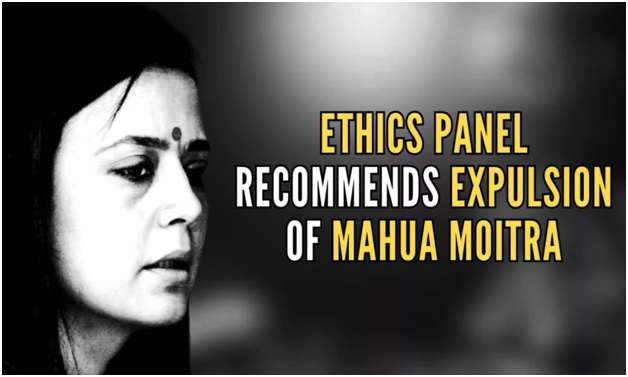Cash For Query Charges: Mahua Moitra To Be Barred From The LS (Indian Express)

- 10 Nov 2023
Why is it in the News?
The Ethics Committee of Lok Sabha, which inquired into the cash-for-query allegations leveled by BJP MP Nishikant Dubey against TMC MP Mahua Moitra, adopted its draft report Thursday, recommending her expulsion from the 17th Lok Sabha for “unethical conduct” and “serious misdemeanors.”
Cash-for-Query (Mahua Moitra) News Summary:
- The report recommending Moitra's expulsion was labeled 'prejudiced and incorrect' by 4 opposition panel members.
- They accused the Ethics Committee chairman and BJP members of breaching rules by leaking panel proceedings.
- Next Steps: Former Lok Sabha Secretary General P. D. T. Achary states that the speaker now holds the authority to decide whether the report will be made public.
- In the upcoming parliamentary session, the committee's chairperson will present the report, sparking a debate and a subsequent vote on the member's expulsion.
- This event could mark a historic moment as it might be the first time the Lok Sabha Ethics Committee suggests an MP's expulsion.
- A prior 'cash-for-query' case in 2005 saw 11 MPs facing expulsion, but it was the Rajya Sabha Ethics Committee and a Lok Sabha Inquiry Committee that proposed those expulsions.
The 2005 Cash-for-Query Scandal:
- Back in 2005, a hidden camera sting operation exposed the involvement of 11 Members of Parliament who were allegedly willing to use their positions to promote a company and ask questions in the House in exchange for money.
- As a result of the parliamentary committee's investigations, 10 Members of Lok Sabha faced expulsion from the lower house.
- Furthermore, the Rajya Sabha conducted its own inquiry through the Ethics Committee, leading to the expulsion of 1 of its members.
- In 2007, the Supreme Court upheld these expulsions, asserting that the authority to expel members was within the privileges and immunities of Parliament.
- This landmark decision was made in the case of Raja Ram Pal v/s The Hon'Ble Speaker.
About the Lok Sabha’s Ethics Committee:
- Committee Formation:
- The Speaker appoints members to the Ethics Committee for a one-year term.
- This 15-member Committee is responsible for investigating complaints about unethical behavior by Lok Sabha Members referred by the Speaker, offering recommendations accordingly.
- Historical Insight:
- The concept of ethics panels for both Lok Sabha and Rajya Sabha was first discussed at a 1996 conference in Delhi.
- Vice President K. R. Narayanan established the Rajya Sabha's Ethics Committee in 1997 to oversee moral conduct and examine misconduct cases.
- The idea for a Lok Sabha Ethics Committee emerged in 1997 but was officially recommended during the 13th Lok Sabha by the Committee of Privileges.
- An ad hoc Ethics Committee was formed in 2000 by the late Speaker G. M. C. Balayogi, eventually becoming a permanent House fixture in 2015.
- Handling Complaints:
- Anyone, through a Lok Sabha MP, can file a complaint against a Member, supported by evidence and a statement verifying the complaint's validity.
- The Committee also considers self-complaints by Members without the need for an affidavit.
- The Speaker refers complaints against MPs to the Committee after a preliminary inquiry.
- Function and Scope:
- The Committee examines complaints but does not entertain those solely based on media reports or matters under legal consideration.
- It presents its findings to the Speaker, seeking approval for the report's consideration.
- There's provision for a brief discussion on the report in the House.
Ethics Committee vs. Privileges Committee: A Comparison
- Overlap in Responsibilities: The roles of the Ethics Committee and the Privileges Committee often coincide, leading to some shared functions.
- The regulations, such as those outlined in the Rules of Procedure and Conduct of Business in the Lok Sabha, that are applicable to the Committee of Privileges also extend to the Ethics Committee.
- Handling Allegations: When an allegation of corruption involving an MP arises, it can be directed to either committee. Typically, more severe accusations are referred to the Privileges Committee.
- Privileges Committee's Mandate: The primary role of the Privileges Committee is to protect the "freedom, authority, and dignity of Parliament."
- These privileges apply to individual Members as well as the entire House, ensuring their collective and individual dignity and authority.
- Breach of Privilege: MPs can be investigated for breaching privilege, and individuals who are not MPs can also face allegations of breaching privilege for actions that challenge the authority and dignity of the House.
- Ethics Committee's Focus: In contrast, the Ethics Committee's main responsibility is addressing cases of misconduct involving Members of Parliament only.
What Lies Ahead?
The time taken by a Committee depends on the complexity of the case it's handling. However, the Committee lacks the authority to refer cases to investigative agencies like the CBI or the Police. It also doesn't possess executive powers to directly penalize a Member.
Instead, the Committee can recommend the suspension of a Member for a defined period. These recommendations are then presented to the House for approval or rejection, including the suggested punishment. In the event of claims related to unconstitutionality, gross illegality, or denial of natural justice, a Member has the option to challenge the decision in a court of law.
